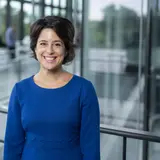
Professor Teresa Chahine
Sheila and Ron ’92 Marcelo Senior Lecturer in Social Entrepreneurship
By Karen Guzman
Public health expert Teresa Chahine began teaching a course on entrepreneurship in public health at Harvard University in 2013. She knew that entrepreneurship held great promise to address global health equity issues but noticed pretty quickly that the curriculum was lacking. “None of the existing entrepreneurship frameworks were a good fit for public health,” she says.
One problem, Chahine explains, is that an entrepreneurship curriculum typically envisioned the “exit,” or sale of a successful venture to a larger firm, as the goal. “But exiting isn’t the endgame in public health. We needed something new.”
Five years later, Chahine joined the faculty at the Yale School of Management as the inaugural Sheila and Ron ’92 B.A. Marcelo Lecturer in Social Entrepreneurship. Surrounded by faculty experts in a wide variety of disciplines, she revisited her old entrepreneurship curriculum.
“It was a great opportunity to dedicate some time to developing a framework that specialized in public health,” Chahine says. As she got down to work, something unexpected happened: Chahine found her work constantly enriched—in ways she hadn’t imagined—through collaboration with her Yale SOM faculty colleagues
“We have psychologists and sociologists in the organizational behavior group, economists in the marketing group, operations researchers in the finance group, and urban planners in the operations group,” she says. “I love that while it’s called the Yale School of Management, there’s not one faculty member who’s studied just ‘management,’ because what we teach is the product of many different fields. Each one of us carries a unique combination of experiences, and when we can bring them all together, the possibilities are boundless.”
Chahine conducted a literature review on existing patterns in public health entrepreneurship and “intrapreneurship”—entrepreneurial efforts within an existing organization—and identified the core components that successful ventures share, including design thinking, resource mobilization, financial viability, cross-disciplinary collaboration, and systems strengthening.
Armed with these new insights, Chahine redrafted her entrepreneurship curriculum, creating a new framework called “Public Health Entrepreneurship & Intrapreneurship.” Her findings became first a working paper that she shared with her students and then a peer-reviewed study published in spring 2021.
From a young age, Chahine felt drawn to address global health issues. A native of Lebanon, she studied biology and then earned a master’s degree in genetics in 2000, the same year that the United Nations adopted its Millennium Development Goals. “The global agenda became our agenda,” Chahine says, “and it resonated with me much more, coming from a low-income country.”
Chahine was most interested in determining and addressing the drivers of health—the health effects of our behavior and environment—and how to improve them, especially in the developing world. She earned a PhD from Harvard’s public health school in 2010.
While she found public health coursework enriching and important, it felt like something was missing.
“They were training us to become experts in the problems but not necessarily in the solutions,” Chahine explains.
Then she discovered the social entrepreneurship space and immediately recognized its power to advance global health initiatives. “It’s exciting now to see this new area of public health practice emerge and to see the literature grow, and to be part of that,” she says.
After graduating, Chahine taught at Harvard’s T.H. Chan School of Public Health while also running a Lebanese NGO that supports social enterprises bringing education and training to marginalized populations.
When she first learned about a newly created faculty position, focusing on social entrepreneurship, in the Yale School of Management’s entrepreneurship program, she was intrigued but uncertain. “I was a public health person,” she says. “My background is in the social and environmental determinants of health, so teaching at a business school didn’t sound right to me.”
So Chahine began talking with people at Yale. One of them was Tony Sheldon ’84, a veteran of international economic development and the executive director of Yale SOM’s Program on Social Enterprise, Innovation, and Impact, who told her about SOM’s mission-driven, cross-sectoral approach. Sten Vermund, dean of the Yale School of Public Health (YSPH), “explained how interdisciplinary the culture is at Yale,” Chahine says, “and how I would be able to work with colleagues, and also with students, from all across the campus.”
Vermund also promptly invited Chahine to take part in InnovateHealth Yale, a YSPH program focused on solutions to public health and education challenges in underserved communities.
“In the end, I came here knowing I could still be a public health person,” Chahine says. Many of the students she teaches in Yale SOM’s Edward P. Evans Hall come from YSPH and other Yale schools.
Chahine teaches three courses: Public Health Entrepreneurship, a case-based course; Social Entrepreneurship Lab, which invites student teams to research and draft interventions that address a social or environmental challenge; and Startup Founders Practicum, where she mentors student entrepreneurs.
“It’s one of the most rewarding things I get to do,” Chahine says. “I’ve stayed in touch with many of my mentees after they’ve graduated and am so proud of the ways in which they are changing the world.”
In the classroom, Chahine says, she teaches to learn. “We ask the questions that we don’t have the answers to, and I learn a lot by exploring these issues with my students and with the case protagonists we bring into class.”
Chahine says her students are exceptionally bright and committed to making a difference. “I learn so much from this new community we are creating together,” she says. “My students are the embodiment of Yale SOM’s mission to educate leaders for business and society. They give me hope for the future because they question everything. And that’s what we need. In order to change the status quo, we first need to challenge it.”



